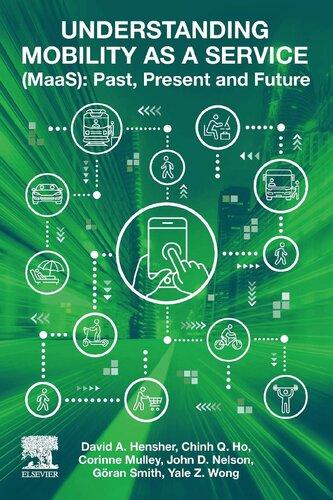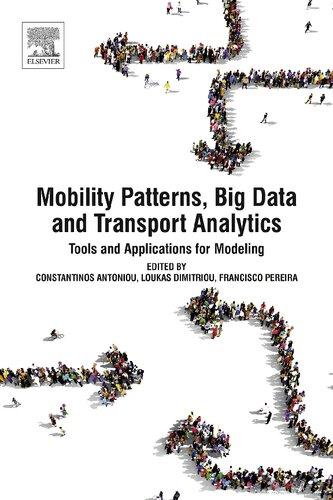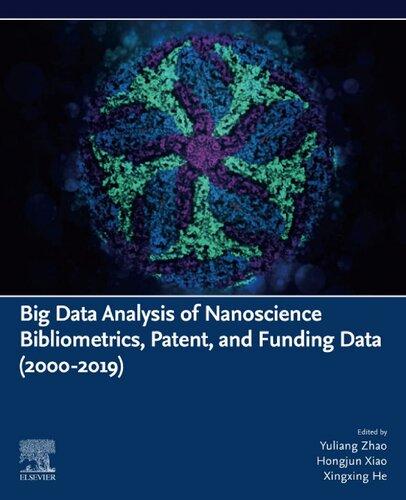BigDataandMobility asaService
Editedby HaoranZhang
CenterforSpatialInformationScience,TheUniversityofTokyo,Kashiwa, Chiba,Japan
XuanSong
DepartmentofComputerScienceandEngineering,SouthUniversityof ScienceandTechnology,Nanshan,China
CenterforSpatialInformationScience,TheUniversityofTokyo,Kashiwa, Chiba,Japan
RyosukeShibasaki
CenterforSpatialInformationScience,TheUniversityofTokyo,Kashiwa, Chiba,Japan
Elsevier
Radarweg29,POBox211,1000AEAmsterdam,Netherlands
TheBoulevard,LangfordLane,Kidlington,OxfordOX51GB,UnitedKingdom 50HampshireStreet,5thFloor,Cambridge,MA02139,UnitedStates
Copyright©2022ElsevierInc.Allrightsreserved.
Nopartofthispublicationmaybereproducedortransmittedinanyformorbyanymeans, electronicormechanical,includingphotocopying,recording,oranyinformationstorageand retrievalsystem,withoutpermissioninwritingfromthepublisher.Detailsonhowtoseek permission,furtherinformationaboutthePublisher’spermissionspoliciesandourarrangements withorganizationssuchastheCopyrightClearanceCenterandtheCopyrightLicensingAgency,can befoundatourwebsite: www.elsevier.com/permissions
Thisbookandtheindividualcontributionscontainedinitareprotectedundercopyrightbythe Publisher(otherthanasmaybenotedherein).
Notices
Knowledgeandbestpracticeinthisfieldareconstantlychanging.Asnewresearchandexperience broadenourunderstanding,changesinresearchmethods,professionalpractices,ormedical treatmentmaybecomenecessary.
Practitionersandresearchersmustalwaysrelyontheirownexperienceandknowledgeinevaluating andusinganyinformation,methods,compounds,orexperimentsdescribedherein.Inusingsuch informationormethodstheyshouldbemindfuloftheirownsafetyandthesafetyofothers, includingpartiesforwhomtheyhaveaprofessionalresponsibility.
Tothefullestextentofthelaw,neitherthePublishernortheauthors,contributors,oreditors, assumeanyliabilityforanyinjuryand/ordamagetopersonsorpropertyasamatterofproducts liability,negligenceorotherwise,orfromanyuseoroperationofanymethods,products, instructions,orideascontainedinthematerialherein.
LibraryofCongressCataloging-in-PublicationData
AcatalogrecordforthisbookisavailablefromtheLibraryofCongress
BritishLibraryCataloguing-in-PublicationData
AcataloguerecordforthisbookisavailablefromtheBritishLibrary
ISBN:978-0-323-90169-7
ForinformationonallElsevierpublications visitourwebsiteat https://www.elsevier.com/books-and-journals
Publisher: JoeHayton
EditorialProjectManager: HowiM.DeRamos
ProductionProjectManager: PunithavathyGovindaradjane
CoverDesigner:MilesHitchen
TypesetbySTRAIVE,India
Contributorsxi
Introductionxiii
ShreyasBharule,HaoranZhang,andRyosukeShibasaki
1.MaaSsystemdevelopmentandAPPs 1 WenjingLi,RyosukeShibasaki,HaoranZhang,and JinyuChen
1.ThedevelopmenthistoryofMaaS 1 1.1Theconception1 1.2Theearlyapplication1 1.3MaaSalliance2
1.4Development3 1.5Revolutionandinnovation4
2.ThecategoryofMaaSsystem 5
2.1Level0:Nointegration6
2.2Level1:Informationintegration6
2.3Level2:Integrationofbookingandpayment6
2.4Level3:Integrationoftheserviceoffering6 2.5Level4:Integrationofsocietalgoals7
3.Studycase 7 3.1UbiGo10 3.2Whim12 3.3Moovit15 3.4Uber17
4.FuturedevelopmenttrendofMaaSsystem 21 4.1Data-integrated21 4.2Future-oriented22 4.3Sustainable23 References 23
2.Spatio-temporaldatapreprocessingtechnologies 25 JinyuChen,HaoranZhang,WenjingLi,and RyosukeShibasaki
1.Introduction 25 2.RawGPSdataandworkflowofdatapreprocessing 26
3.Keytechnologiesandcorrespondingapplication 27 3.1Outlierremovement27
3.2Staylocationdetection29 3.3Travelsegmentation30
3.4Travelmodedetection31 3.5Mapmatching33 3.6Summary35
4.Casestudy 35
4.1Staylocationdetection:Lifepatternanalysis35
4.2Travelsegmentationandmodedetection:Ride-sharing potentialanalysis48
4.3Mapmatching:EstimationofurbanscalePMemission60
5.Conclusion
3.Travelsimilarityestimationandclustering 77
YuhaoYao,RyosukeShibasaki,andHaoranZhang
2.Trajectorysimilarity 79
2.1Point-to-pointdistancemetric80
2.2Similarityfunctionoftrajectory82 2.3Trajectoryclustering87
3.Travelpatternsimilarity 90 3.1Travelpatternextraction91
3.2Travelpatternexpression92
3.3Travelpatternclustering93
4.Origin-destinationmatrixsimilarity 93
4.1VolumedifferencefocusedODsimilaritymeasure95
4.2Image-basedODsimilaritymeasure96
4.3Transformingdistance-basedODsimilaritymeasure97
4.4ODtableausimilaritymeasure:Mobsimilarity98
5.Casestudy 103
5.1CDR-basedtravelestimationaccuracyanalysis103 5.2Metrousagepatternclustering106
6.Conclusionandfuturedirections 106 References 108
4.DatafusiontechnologiesforMaaS 113
YiSui,HaoranZhang,WenxiaoJiang,RenchengSun, andFengjingShao
1.Introduction 113
2.Dataformula 115
2.1Attributeandeventdata115 2.2Trajectorydata116
2.3Origin-destination(OD)tripdata117 2.4Correlationnetwork117 2.5Environmentaldata118
3.CategoriesofdatafusionmethodsinMaaS 119
4.Datafusionbasedondeeplearning 122
4.1Fundamentalbuildingunitsofdeeplearningnetwork122
4.2Fusionstrategy130
5.Decomposition-basedmethods 135
6.ChallengingproblemsofdatafusioninMaaS 137
6.1Dataquality137
6.2Modelcomplexity137
6.3Datafusionincomparativeanalysis138
7.Conclusions 138 Acknowledgments 138 References 138
5.Data-drivenoptimizationtechnologiesforMaaS 143 HaoningXi
1.Overviewofdata-drivenoptimizationfortheurbanmobility system 143
1.1Data-drivendispatchingmethodsforon-demand ridesharing143
1.2Data-drivenschedulingmethodsforpublictransit147
1.3Data-drivenrebalancingmethodsfor bicycle-sharing148
2.OverviewofthegeneralconceptinMaaSSystem 149
2.1OverviewoftheMaaSsystems149
2.2OverviewofdatainMaaSsystems150
3.MobilityresourceallocationinMaaSsystem 152
3.1MobilityresourceallocationframeworkinMaaS152
3.2Data-drivenonlinestochasticresourceallocation problems157
4.Data-drivenoptimizationtechnologiesforresourceallocation inMaaS 157
4.1Sampleaverageapproximation158
4.2Robustoptimization159
4.3Predictiveanalysisandprescriptiveanalysis161
4.4Machinelearning-basedrobustoptimization162
5.Real-worldapplicationandcasestudy 164
5.1Problemdescription164
5.2Methodology165
5.3Resultsanddiscussion165
6.Conclusions 170 References 171
6.Data-drivenestimationforurbantravel shareability 177
QingYu,WeifengLi,andDongyuanYang
1.Introduction 177
1.1Theemergenceofsharingtransportation177
1.2Thesignificanceofshareabilityestimation178
1.3Chapterorganization178
2.Emergingsharingtransportationmode 179
2.1Bicyclesharing180
2.2Ridesharingandtaxisharing181
2.3Customizedbus182
2.4Characteristicsofsharingtransportationmodes182
3.Backgroundtotraditionaldataandtheirlimitations 183
4.Newandemergingsourceofdata 183
4.1Trackandtracedata184
4.2Geographicinformationdata185
4.3Advantagesanddisadvantagesofnewdatasources186
5.Emergingformofkeytechnologies 187
5.1Agent-basedmodeling187
5.2HowABMcanbeappliedinshareabilityestimation188
6.CasestudyofABMinurbanshareabilityestimation 190
6.1Dynamicelectricfenceforbicyclesharing190
6.2ABMsimulation191
6.3Dataandstudyarea192
6.4Resultofsimulation192
6.5Evaluationoftheresult194
7.Opportunitiesandchallenges 197
7.1Dataacquisition197
7.2Demandprediction198
7.3DesignimprovementofABM198
7.4Accelerationoflarge-scaleABM198
8.Conclusions
7.DataminingtechnologiesforMobility-as-a-Service (MaaS) 203
Wen-LongShang,HaoranZhang,andYiSui
1.IntroductionofdataminingtechnologiesinMaaSsystem 203
2.DataminingtechnologiesinMaaSsystem 204
2.1Whatisdatamining?204
2.2Objectofdatamining205
2.3Classicalstepsofdatamining205
2.4Typesoftransportationdata207
3.MethodologiesofdataminingtechnologiesusedinMaaS system 209
3.1Supportvectormachine209
3.2Linearregression213
3.3Decisiontree216
3.4Clusteringanalysis219
4.CasestudyofdataminingforMaaS:BikesharinginBeijing duringCovid-19pandemic 223
5.Summaryofchapter 227 References 228
8.MaaSandIoT:Concepts,methodologies,and applications
HongbinXie,XuanSong,andHaoranZhang
1.Introduction
2.Overviewoftheconcept
2.1Overviewofthegeneralconcept230
2.2ChallengesofIoTapplicationinMaaS231
3.Keytechnologiesandmethodologies 231
3.1Intelligenttransportationequipment231
3.2CommunicationprotocolsfortheInternetofThings232
3.3MicroservicesbasedontheInternetofThings232
3.4CloudcomputingbasedontheInternetofThings234
3.5Edgecomputing235
3.6SecuritytechnologiesfortheInternetofThings236
4.Applicationandcasestudy
5.Conclusionandfuturedirections
9.MaaSsystemvisualization
ChuangYang,RenheJiang,andRyosukeShibasaki
1.Overviewofthegeneralconcept
2.ThekeyvisualizationtechnologiesinMaaSfordifferent stakeholders
2.1Theperspectiveofdemandersofmobility247
2.2Theperspectiveofsupplieroftransportationservice248
2.3Theperspectiveofcitymanager252
3.Real-worldapplicationandcasestudy 254
3.1Casefordemandersofmobility254
3.2Caseforsupplieroftransportationservice255
3.3Caseforcitymanager257
3.4Open-sourcevisualizationtoolsandlibraries258
4.Conclusionandfuturedirections 261
10.MaaSforsustainableurbandevelopment
XiaoyaSong,RongGuo,andHaoranZhang
1.Introduction
2.MaaSinteractedwithurbantrafficandspace
2.1Urbantrafficstructure267
2.2Urbanspatialstructure269
3.StrategiesforMaaSinurbansustainabledevelopmentat multiplescales 269
3.1Macroscale:Synergybetweenurbanagglomerationsand metropolitanareas270
3.2Mesoscale:Optimizationofinternalresourcesincities271
3.3Microscale:Therefinementofurbanstreets271
4.Casestudy
5.Conclusion
Contributors
Numbersinparenthesisindicatethepagesonwhichtheauthors’contributionsbegin
ShreyasBharule (xiii),LocationMindInc.,Tokyo,Japan
JinyuChen (1,25),CenterforSpatialInformationScience,TheUniversityofTokyo, Kashiwa,Chiba,Japan
RongGuo (265),KeyLaboratoryofColdRegionUrbanandRuralHumanSettlement EnvironmentScienceandTechnology,MinistryofIndustryandInformation Technology,SchoolofArchitecture,HarbinInstituteofTechnology,Harbin,China
RenheJiang (245),CenterforSpatialInformationScience,TheUniversityofTokyo, Kashiwa,Chiba,Japan
WenxiaoJiang (113),CenterforSpatialInformationScience,TheUniversityofTokyo, Kashiwa,Chiba,Japan
WeifengLi (117),KeyLaboratoryofRoadandTrafficEngineeringoftheMinistryof Education,TongjiUniversity,Shanghai,China
WenjingLi (1,25),CenterforSpatialInformationScience,TheUniversityofTokyo, Kashiwa,Chiba,Japan
Wen-LongShang (203),BeijingKeyLaboratoryofTrafficEngineering,Collegeof MetropolitanTransportation,BeijingUniversityofTechnology,Beijing,China
FengjingShao (113),InstituteofSmartCityandBigDataTechnology,Qingdao,China
RyosukeShibasaki (xiii,1,25,77,245),CenterforSpatialInformationScience,The UniversityofTokyo,Kashiwa,Chiba,Japan
XiaoyaSong (265),KeyLaboratoryofColdRegionUrbanandRuralHumanSettlement EnvironmentScienceandTechnology,MinistryofIndustryandInformation Technology,SchoolofArchitecture,HarbinInstituteofTechnology,Harbin,China
XuanSong (229),DepartmentofComputerScienceandEngineering,SouthUniversity ofScienceandTechnology,Nanshan,China;CenterforSpatialInformationScience, TheUniversityofTokyo,Kashiwa,Chiba,Japan
YiSui (113,203),CollegeofComputerScienceandTechnology,QingdaoUniversity, Qingdao,China;CenterforSpatialInformationScience,TheUniversityofTokyo, Kashiwa,Chiba,Japan;InstituteofSmartCityandBigDataTechnology,Qingdao, China
RenchengSun (113),CollegeofComputerScienceandTechnology,Qingdao University,Qingdao,China;CenterforSpatialInformationScience,TheUniversity ofTokyo,Kashiwa,Chiba,Japan;InstituteofSmartCityandBigDataTechnology, Qingdao,China
HaoningXi (143),SchoolofCivilandEnvironmentalEngineering,UniversityofNew SouthWales,Sydney;Data61,CSIRO,Canberra,Australia
HongbinXie (229),DepartmentofComputerScienceandEngineering,South UniversityofScienceandTechnology,Nanshan,China
ChuangYang (245),CenterforSpatialInformationScience,TheUniversityofTokyo, Kashiwa,Chiba,Japan
DongyuanYang (177),KeyLaboratoryofRoadandTrafficEngineeringoftheMinistry ofEducation,TongjiUniversity,Shanghai,China
YuhaoYao (77),CenterforSpatialInformationScience,TheUniversityofTokyo, Kashiwa,Chiba,Japan
QingYu (177),KeyLaboratoryofRoadandTrafficEngineeringoftheMinistryof Education,TongjiUniversity,Shanghai,China
HaoranZhang (xiii,1,25,77,113,203,229,265),CenterforSpatialInformation Science,TheUniversityofTokyo,Kashiwa,Chiba,Japan
Introduction
ShreyasBharulea,HaoranZhangb,andRyosukeShibasakib
aLocationMindInc.,Tokyo,Japan, bCenterforSpatialInformationScience,TheUniversityof Tokyo,Kashiwa,Chiba,Japan
1Background
Datawasoriginallymanual.Transportationdataforthelongesttimewerecollectedthroughclickersatjunctions.However,inthelastdecade,wehaveseena rapidtransformationofthemobilitylandscape.Theconvergenceoftechnologiessuchassmartphones,sensors,theInternetofThings,andappswithin smartphoneshaverevolutionizedhowwelookateveryformoftransportation, particularlytointerpretandpredictthemovementofgoodsandpeopleinreal time.Inrecentyears,mobilityservicessuchasUberfortaxiservice,DHLfor logistics,andothershaveusedvarioustechnologiesthatcollectivelyimpact howwemoveinlong-andshort-haultransportation.
Also,thenumberofsensorsalsousedtocollectdata,bothstationaryand mobile,hasincreasedmultifold.Theyaregeneratingandcollectingrelational datatoexamineissuesandresolvechallenges.Suchaconvergenceoftechnology andtheresultantemergingservicesarechanginghowcitiesrespondtonewer typesofgoodsandpeoplemovementsthroughMobilityasaService(MaaS). Thestatedadvantagesofusingtheseservicesareconvenience,real-timeinformation,andconnectivitytogowhereverthetravelerwantstogo.Thoughsuch possibilitiesaremarketedaslimitless,therearetechnicallimitations.
Bigdata-drivenMaaSdevelopmentisanemergingareabothinacademic andindustrialaspects.Thoughseveralresearchstudiesandtechnicalreports areavailable,aclearlinktounderstandbigdatainMaaSappearsvagueand fragmented.Inthisbook,weaimtofillthisgapbysystematicallysummarizing theknowledgeinthisfield—thechaptersinthebookoutlinetheareastostreamlinetheunderstandingofbigdataanalyticsforMaaS.
2Bigdata:Definition,history,today
Bigdataismadeupoflarger,complexdatasetsthatoriginatefromincreasingly newsourcesofdata.Thesedatasetsaresomassivethattheabilitiesoftraditionaldataprocessingsoftwareareinsufficienttomanagethem.Nevertheless, thesemassivevolumesofdatacanbeusedtoaddressbusinessproblemsthat wouldnothavebeentackledbefore.
Asimpledefinitionofbigdataorganizedaroundbigdata’sthreeVscouldbe large volumes ofdatathatcontainimmense variety andaregeneratedatincreasing velocity.Recently,sixotherVsandoneChavebeenaddedtodefinethe truthfulnessandmeaningfulnessofdataas veracity,infrequencyas validity, extracting value fromthecollecteddata,replicabilityintheformof visualizations, processabilityina virtual cloudplatform,data variability,and complexity,purelyincomputationform.
Thoughtheconceptofbigdataisstillemerging,theoriginsoflargedatasets gobacktothe1970swhentheworldoforganizeddatainthefirstdatacenters wasemerging.Inaddition,thedevelopmentoftherelationaldatabasefurther consolidatedtheconcept.Around2005,researchersidentifiedjusthowmuch datausersgeneratedthroughSNS,videostreamingservices,andotheronline services.Inparalleltothesedevelopments,dataorganizationandstoragesystemsweredevelopedaswell.Hadoop,anopen-sourceframeworkcreatedspecificallytostoreandanalyzelargedatasets,wasdevelopedaroundthesame year.Thisdevelopmentofopen-sourceframeworkssuchasHadoop,Spark, andotherswasessentialforthegrowthofbigdatabecausetheymakedatastoragecheaperandenhancetheeaseofengagingwithbigdatasets.
Nevertheless,thevolumeofbigdatahasbeenatanall-timehigh,asisthe dependencyonitfordecisionmaking.Usersofthesystemarestillgenerating significantamountsofdata.However,itisnotjusthumansthatareengaging withsystems.Evolutioninsmartphoneandsensortechnologynowallows devicestocommunicatethroughtheInternetofThings(IoT)network.Besides, advancementsindevicesandcommunicationnetworksystemshaveeaseddata gatheringforvariousindicatorsanddrawingperformanceinsights.Moreover, theemergenceofartificialintelligenceandmachinelearninghaschurnedout diversityandcross-operabilityacrossvariousplatforms.
Furthermore,cloudcomputinghasexpandedbigdatapossibilitiesintruly elasticscalability.Suchscalabilityisofcriticalimportanceinanalyzingand supportingdemandsinservices.Wefocusonthisaspectofbigdatatosolve challengesthathinderfuturedevelopment,particularlyinunderstandingthe emergingareaof MaaS.
3MaaS:Definition,history,today
MaaSisanewconceptinthetransportsector;itprovidesanewwayofthinking abouthowthedeliveryandconsumptionoftransport(ormobility)aremanaged. Inordertohaveacommonstartingpointwithinthebookprojectgroup,itwas importanttohaveacommondefinitionforMaaS.AlthoughMaaSisregardedas amajorparadigmshiftintransportationtowardmoreenvironmentallyfriendly andefficientlyusedtransportmodes,describingallimportantMaaSfacetsis relevantfordeterminingthemainresearchscope.
Thoughthereisrelativelylittleliteratureontheplanningandconceptsof MaaSsystems,MaaSasaconceptwasfirstdescribedin1996asan“intelligent
Another random document with no related content on Scribd:
poor Ann may remember my words, when I am no more here to speak them."
Martin raised his hand to his brow, for a faintness was coming over him. "God help me to be so careful in my daily conduct, to keep my lips and my life so pure, that my wife must own, however unwillingly, that in trying to be a better Christian, I am also a better husband, father, and friend. When she taunts me with being a saint, may I have grace to become one indeed, that, at least, she may never think me a hypocrite, saying one thing and doing another."
Ann would scarcely speak to her husband during all the time of breakfast, but she missed no opportunity of speaking at him, addressing herself to their child.
"Ah! You want more butter to your bread, do you?" she cried, pushing towards Annie a slice which she had just cut from the loaf. "Your father takes good care that we shan't have butter, and it will soon come, I suppose, to doing without the bread too!"
Ann glanced angrily towards the darkened shop as she spoke.
Annie held out her little foot to her mother, one of her tiny shoes needed repair, and the cotton sock appeared through a hole in the leather.
"So you want new shoes, little brat!" cried Ann. "I only wish you may get them! You'll have to run barefoot about the streets soon, and what will you do then, I wonder!"
"Ask Daddy carry me!" lisped the little child, as she calmly went on with her meal, undisturbed by fears for the future.
Even Ann could scarcely help smiling at the unexpected reply.
And Martin, as he stooped to kiss his little one, thought, "if she can so quietly trust her father, shall I not trust mine, who is the Giver of all good things?"
"I suppose you'll be going to some prayer-meeting or other?" said Ann, abruptly, to her husband, as soon as the uncomfortable meal was ended.
"I am going to church," replied Martin, and he could not forbear adding, "I wish we could go there together."
"Oh! I'm no saint, whatever you may be!" exclaimed Ann, with a jerk of the head. "I'm going to Greenwich with the Battens and their set—a lark on the river is a deal more to my taste than all your preaching and praying. I shall pay for my trip with my last Sunday's earnings, which I've kept for the purpose," she added, to give a keener sting to her taunt.
"I should be the last to wish to deprive you of any harmless pleasure," said her husband; "but if you spend the Lord's day in such an excursion, it will be without my consent."
"Your consent, indeed, I never asked for it!" exclaimed the rebellious wife to him whom she had vowed before God to obey. "You go your way, I will go mine; with your leave or without your leave, I'm off to Greenwich by two."
The husband and wife were, indeed, walking on different paths, such as must conduct to different ends. "Broad is the way that leadeth to destruction, and many there be which go in thereat; because strait is the gate, and narrow is the way, which leadeth unto life." * These are our
Lord's own words; but how few act as if they believed them to be true!
* Matt. vii. 13, 14.
Crowds press along the broad way, careless and disobedient, yet hoping that, after all, peace and rest and Heaven will be theirs at the end! "Ye shall not surely die" † is the Devil's whisper still, and, like Eve, we are too ready to listen. But let those who would continue in their sins remember that God hath declared in His word that "the end of these things is death," ‡ and that they who are His servants indeed have their fruit unto holiness, and the end everlasting life.
† Gen. iii. 4. ‡ Rom. vi. 21.
CHAPTER IV.
Sabbath Hours.
MARTIN found the time spent in church a time of refreshing, and returned to his home in a quiet, tranquil mood, better able to bear and to forbear, with the charity which hopeth and endureth all things. It grieved him, however, to see his wife dressed in as flaunting a style as their narrow means would allow, and his child also decked
out in tawdry finery, wearing a faded red sash, and a blue bead necklace round her neck.
The dinner was as uncomfortable a meal as the breakfast had been, though Mrs. Laver now put on gaiety of manner, in a spirit of defiance to her husband. She took pleasure in talking to her child of the delights of the coming treat, the band that would play on the deck of the steamer, and all the mirth and fun there would be amongst the company there.
Annie was too young to understand or to care much about such things; she was rather frightened at the idea of going amongst strangers, and looking up with her arch innocent eyes into her father's face, she lisped out, "Daddy come too!"
Martin shook his head, and replied, as he stroked the soft hair of his child, "No, Annie, father is not going in the steamer, father is stopping behind."
"Then Annie 'top too!" cried the little one, thrusting her small hand into that of her parent.
"You little goose, do you mean that you will not go with me, and have all the fun?" asked Ann, in an angry tone, which certainly had not the effect of making the child desire to do so.
"No, Annie 'top with Daddy!" repeated the little one, beginning to cry at the idea of being taken away.
"Oh! I'm sure I don't want you, you'd be only a plague; there's nothing so tiresome as having children dangling about one in a steamer; one's always afraid of the stupid brats falling overboard," cried Ann, with a passionate jerk. "It's time I was off," she said, rising from the table; "your
father will have had enough of your company, I guess, before I come back in the evening."
But here Mrs. Laver was wrong. Never had the invalid more enjoyed a walk than he did the quiet stroll which he took into Kensington Gardens on that warm afternoon, to give his pale little girl fresh air. How pleasant felt the breeze on his cheek, how bright were the rays of sunshine that streamed here and there through the trees, what a thankful heart was lifted up to God from him who so lately had left a sick-bed, as he sat quietly on the green grass, with his darling playing at his feet!
Annie's simple prattle was to her father's ear sweeter than any music, and scarcely disturbed the holy thoughts which were passing through his mind.
"Much as I delight in my child, should I be willing that she should remain always what she is now, small, weak, and knowing little? I look for growth in her young frame, and if from month to month she never grew taller, I should know that some disease must be stunting my child. So we are told in the Scripture to 'grow in grace,' * every passing month should leave us more earnest, devout, and humble. If our religion be not a growing one, it is a stunted one, nay, we have reason to fear lest it be dead altogether. Faith, true living faith, must expand into holiness, as the bud opens into the flower, and the dawn brightens into the day!"
* 2 Peter iii. 18.
Annie and her father were very happy together; and when Martin slowly walked homewards, holding the hand of the little prattler who trotted by his side, it seemed to him that but for one trial, he would be one of the happiest men
upon earth. But the remembrance of his wife was to Martin like a heavy black cloud in an otherwise brilliant sky. Silently, he prayed for Ann as he walked, though little knowing how much at that moment she needed his prayers.
Scanty as was the evening meal, Annie made it a very merry one. No butter had been left from the breakfast, so she played at spreading the dry bread with her spoon, and when her father cut it into pieces, and called them soldiers, the child ate it as contentedly as if it had been iced-cake. Then a few empty reels to play with, made the little one perfectly happy; and while she rolled them backwards and forwards on the floor, Martin could quietly enjoy the pleasure of reading.
First, he read his Bible, then a book which had been lent to him by the chaplain of the hospital which he had recently quitted. It contained the Memoir of a missionary's wife, * who had laboured amongst the Jews in the Turkish province of Moldavia. Martin felt particularly interested in the account given of Nahum, a convert, as conveyed in such passages as these, which I extract from the published letters of the lady:
"I wish I could bring before you an aged man, highly esteemed among the Jews, and also by the Rabbis, a respectable shopkeeper, a good Hebrew scholar . . . He is of an acute and philosophical turn of mind, and was a bitter opposer of Christianity. Fancy this man brought to the feet of Jesus, and you will see our most interesting Rabbi Nahum . . . He says that in hours of need he has prayed in the name of Christ, and is now praying for strength to confess Christ openly; but he says Abraham was praised because he was willing to give up his one child; but he would need to be nine times as strong as Abraham to give up his nine. He desires the prayers of Christ's people."
* Memoir and Letters of Mrs. Edwards.
"Poor fellow! Poor fellow!" murmured Martin, pausing for a moment in his reading. "His was a hard test of faith indeed; but could he not take his children with him?" And the father glanced fondly at his Annie, before he went on with his book.
Some way farther on in the volume, he again found mention of Nahum.
"His mind seems more and more decided; he speaks now of baptism, though still indirectly. He acknowledges that faith should trust all things to the Lord, that He is able to do all things for us. But who can withhold sympathy from the father of nine children, when taking a step which probably will involve them all in ruin.
"I feel for him from the bottom of my soul!" exclaimed Martin.
After reading several more pages in the volume, Martin came to the account of the baptism of Nahum with three of his children, after bitter opposition from his unconverted wife.
"She would not eat nor drink, she abused and upbraided him," but she could not hold him back from his purpose of openly confessing his Saviour. Martin eagerly read the account of Nahum's first meeting with his wife, after the decisive step had been taken, and her passionate exclamations of sorrow for her three baptised children.
"I hear not—I hear not! I die—I die! I will kill them, then I will die! And indeed," wrote the missionary's wife,
"she threw herself on the balcony ready to die. We feared more for the old man. Twenty-five years have they lived together, true, faithful, attached. After she went, his anguish was fearful."
"Anguish, indeed!" exclaimed Martin. "When I think of this poor Jew's heavy cross, I take shame to myself for shrinking from taking up mine, which is so much lighter. I daresay that he had other troubles to bear besides the fierce opposition of his wife."
Martin read on as follows:
"The dear old man determined on Monday to open his shop, his own shop, in a street where there are none but Jews. He did so, it almost cost him his life. Upwards of a thousand Jews assembled, stones were thrown, and all manner of abuse heaped on him."
"And I," thought Martin, with self-reproach "have deemed it a sacrifice merely to close my shop upon Sundays, to run the risk of a little loss, of having, maybe, one meal less in the day, or a more threadbare coat on my back! What a small—what a paltry sacrifice seems mine by the side of that of this brave old man, with a thousand of his old neighbours and countrymen baiting him, yelling at him, trying to stone, so fierce against him, that I see that it is written a little farther on, 'could they have gotten him they would have minced him into shreds!'—Ah! I am glad that the Germans were able to protect him a little."
In Mrs. Edwards' next letter, Martin read more of the dangers of Nahum and his Christian children, who had taken refuge under the missionary's protection.
"The Jews collected in vast multitudes, the uproar became great, the police could not keep peace. Our house
had been beset with Jews all day looking over the paling, beating any of the lads whom they found in the streets, throwing stones into the court, &c. At length, at night I was awakened by loud noises at the gate; they were trying to break in. Nahum and his children were sleeping in a little room near the gate; their object certainly was to beat or to murder him, and carry off the children . . . A boy on horseback was sent to the Consul for assistance . . . Meantime several Germans had encountered the Jews, and driven them back."
"This poor Nahum seems to have led the life of a hunted hare," observed Martin; "but the worst of all must have been the division between him and his wife. Ah! There seems to be something more about her on the very next page."
He read on—
"His poor wife held out ten days, begging for a divorce, which he would not grant. At length, both she and her eldest son came at night to our house with the young child, and there they all are now. They are very anxious to be baptised."
"Anxious to be baptised!" exclaimed Martin, joyfully, half-closing the book. "Then the tie between man and wife held fast after all the hard strain upon it, and when she could not drag him back from the Lord, her husband drew her towards the Saviour! Here are Christian and Christiana in that far-away place, Moldavia!"
Martin went on with his reading again.
"Ah! I see that the missionary wisely refused to baptise the wife till she should shew that she really desired to be
Christ's, and not merely to please her husband. But Nahum had won the victory; his home was to be a Christian home."
Here is something more about him in a letter from the lady farther on in the book:
"In the old man we have exceeding great joy; he reads each morning the Scriptures with his family, expounds and prays."
"That story of Nahum, the converted Jew, seems as if it were just written for me," cried Martin, laying down the volume on the table. "Here am I, an Englishman, in a Christian land, half-afraid to say to my neighbours, 'I will close my shop on Sundays, because I will honour the law of God,' lest they should, perchance, laugh at me for being 'a Saint.' There was Nahum, openly confessing his faith at the risk of losing both property and life! Here am I, grieved and discouraged by a few hasty words from poor Ann; there was Nahum standing firm against the persuasions, the anger, the despair, of his wife, though he dearly loved her! A poor kind of Christian must I be! I fear but a coward at heart, and ill-fitted to bear the burden and heat of the day. God help me, and give me more grace and more courage, and then, perhaps, He will one day give to me, as to faithful Nahum, more cause to rejoice over a converted and loving wife!"
CHAPTER V.
Darkness and Night.
THE day wore away, twilight came on, Annie grew tired of her play, her eyelids were heavy, she almost dropped asleep in her father's arms, as he carried her gently upstairs, and put her to bed.
Martin was vexed, but not alarmed at the prolonged absence of his wife; he knew that Ann would be unwilling to quit a party of pleasure early, and he was thankful that his little nestling was peacefully asleep in her cot, instead of being kept awake to a late hour in the midst of bustle and noise.
It was not till twilight had given place to night, and storm and rain had come on, that Martin became uneasy and restless. Many times he went to the outer door, and looked anxiously up the street, where the gas-lamps were throwing their yellow light on the brown, wet, glistening pavement. Few passed the shop on that rough night, save the policeman on his beat; even the public-house on the opposite side of the way looked empty and dark.
At last there was the rattle of a cab over the paved road. Martin did not expect his wife to come in such a conveyance and was surprised when the horse was suddenly pulled up, as the voice of Mrs. Batten called out from the window:
"Here! This is the place, the tobacconist's shop."
Then, catching sight of Martin standing at his door, Mrs. Batten called to him in a more subdued tone of distress—
"Oh! Mr. Laver, for mercy's sake come and help her. Gently, gently, we shall hardly be able to get her out of the cab."
"What has happened?" exclaimed Martin, scarcely able to utter the question, Mrs. Batten's tone had sent such a chill of dread to his heart, as he threw open the door of the cab.
"Steamers racing—boiler burst—she is frightfully scalded; we took her to a chemist's, where her hurts were dressed, but she moaned and prayed to be taken home. I thought she'd have died on the road."
Martin heard very few of the words of his neighbour, his whole attention was anxiously given to his miserable wife. Fearfully disfigured, her swollen features half-covered by bandages, Ann's husband would hardly have recognised her as the same flaunting woman who some hours before had quitted his home.
It was a difficult task, even with the aid of Mrs. Batten and the driver, to lift Mrs. Laver out of the cab, and, still more so, to carry her up the narrow staircase. Every touch caused agony, and the unhappy woman swooned as soon as she was laid upon the bed.
"She ought to have been taken to the Infirmary, I said she ought," cried Mrs. Batten; "but she would hear of no place but home."
Little Annie, roused from peaceful sleep, started up from her pillow, startled at the sound of voices in the room, and still more so at the strange and fearful-looking figure stretched on the bed so close to her crib.
"What's that?" cried the child in terror, pointing at her insensible mother.
"Hush! My lamb, lie down," whispered Martin. "Mother's come back from Greenwich, you must make no noise to
disturb her."
Even in that hour of distress Martin thanked God from his heart that his child had not shared the fate of her parent.
Mrs. Batten hurried off in the cab for a doctor, whose arrival was anxiously awaited by Martin. When the medical man had come and examined the patient, he pronounced Mrs. Laver to be in a critical state. She was in great pain of body and anguish of mind, and passed the rest of that night in fearful misery. At an early hour of the morning, Martin, at Ann's own desire, sent an urgent message to Mr. Vale, the clergyman of the parish, to ask him to come and see his sick wife.
"Laver!" repeated Mr. Vale, when the message was delivered by Mrs. Batten. "Surely that is the name on the tobacconist's shop in John Street."
"The very same," said the fishmonger's wife. "I used always to see with regret that shop open when I passed it on Sundays," observed the clergyman, who had once entered it when on his way to church, in order to expostulate with Mrs. Laver both on her Sabbath-breaking, and on the character of some of the ballads exposed in her window. "Last Sunday, however, I noticed that, for the first time, the shutters were up. I suppose that both Laver and his wife had gone on this unfortunate party of pleasure."
"No, sir, not he," replied Mrs. Batten, frankly. "I wish that none of us had had more to do with the matter than Martin Laver. He had words with his wife, she told me herself, poor soul, about that same closing of the shop; he was determined to give up all selling and buying upon
Sundays, and mighty angry was she at what she called his folly; but maybe he was the wiser of the two after all."
Poor Mrs. Laver, moaning on her sick-bed, had good cause to come to the same conclusion. What had she procured with those Sunday earnings which she had reserved for the Sunday treat? A few hours of boisterous pleasure, to be followed by many weeks of pain! And sickness drew poverty after it; for Martin's time was necessarily so much taken up with nursing his wife, and attending to their child, that business was much neglected, while illness brought many expenses. Ann Laver had to pay a very dear price indeed for her frolic down the river, undertaken against the will of her husband.
But this, it may be said, was quite accidental; Ann might have broken the Fourth Commandment every Sunday in her life, and yet have been never the worse.
No, never believe that, my reader, all money unlawfully earned may be called Satan's loan, and at one time or other, a fearful amount of interest has to be paid for every farthing thus borrowed. "Lightly won—lightly gone," says the proverb, but this expresses but half of the truth. Illgotten money not only seems to slip through the fingers, but it leaves a brand on the soul, and a fearful debt on the conscience. An account is kept, and all must be paid for in this world, in the next, or in BOTH! *
* Christ has paid all debts of His saints.
Let not only the godless rich, but the godless poor—the thief, the Sabbath-breaker, the wretched earner of the wages of sin—pause and reflect on this awful sentence, written in God's holy Book—"Your gold and silver is
cankered, and the rust of them shall be a witness against you, and shall eat your flesh as it were fire. Ye have heaped treasure together for the last days!" †
† James v. 3.
CHAPTER VI.
A Way Opened.
THE next six weeks were for Martin, weeks of sore trial. His wife's sufferings brought on her an attack of low fever; his night's rest was broken, his strength exhausted by watching, his business was failing at the very time when comforts were most urgently needed. Martin locked his sorrow in his own heart, and let not a word escape that could distress his suffering wife. He strengthened himself in the Lord, comforting himself with the words of Scripture, "If ye endure chastening, God dealeth with you as sons" . . . thus dealing with His children that they may be "partakers of His holiness." *
* Heb. xii. 7-10.
The visits of Mr. Vale were likewise a great comfort to Martin Laver, especially as they seemed to have a softening effect upon Ann. She was often, indeed, irritable and
complaining; the pain which she had to endure well accounted for that, but she would at least listen to the truth, and never again did she venture to taunt her husband with being a saint.
At the end of six weeks Ann was sufficiently recovered to be able to come again into her shop, and even to take her place behind the counter for a short time, while Martin went to make some necessary purchase.
"Things seem little changed here," said Ann to herself, as she glanced around. "There are the pipes which I tied up myself with a bit of old ribbon, the ballads too in their place, not a soul seems to have bought them. I fear that business has been terribly slack, and my poor Martin looks ill too; he has never had a chance of getting up his strength. He must have had a hard time of it while I was keeping my bed. Oh! Mrs. Batten," cried Ann, as the portly figure of the fishmonger's wife appeared at the door of the shop, "you see I'm again at my post."
"Glad of it, mighty glad of it!" said Mrs. Batten, coming up to the counter, but with little of gladness upon her goodhumoured face. "I'm afraid you've been hard put to it," she added, lowering her voice, "or your good man would not have had his umbrella and greatcoat in pawn."
"In pawn!" exclaimed Ann, with a startled look; for she had little idea of the extent of the difficulties which Martin had had to encounter. "Are you sure that he has them in pawn?"
"As sure as that my name is Betsy Batten. I saw him coming out of the shop, and asked him about it, just as he was turning into the chemist's, next door, to pay a precious long bill."
Ann bit her lip, and silently turned away to busy herself with sorting cigars. Here was a startling confirmation of a fear which had often crossed her mind during her illness, that her husband's business was not thriving, and that, unless matters mended, ruin might soon stare them both in the face.
The tobacconist's wife said nothing more on the subject, though it was never out of her thoughts, until she and Martin were at their quiet evening meal, with little Annie sitting, as usual, upon her father's knee.
"Martin, you're a-hiding something from me," said Ann, abruptly, looking full at her husband. "Don't think I'm afraid to hear truth; I'd rather know it right out at once, and so be prepared for the worst. We'll be bankrupt before the winter sets in."
"No, not so bad as that," replied Martin, calmly; "but now that you are—thank God!—so much stronger, it is better that you should know all. There should never be a secret between man and wife. Ann, I can't get on with this business; it is to me a losing concern; I don't make enough to pay rent and cover expenses."
"And they have been so heavy, so heavy of late!" sighed Ann.
"It is a relief to me to find that Mason, our neighbour round the corner, is willing to take the whole concern off our hands at Michaelmas, if you and I agree in thinking that it is better to give up the business before we are entangled in debt. If this arrangement be settled, we shall then be clear of the world, though," added Laver, with a melancholy smile. "We shall have little enough left, I fear, with which to begin life again."
Ann covered her eyes with her hand, and moaned aloud in her bitterness of spirit. "There's no use in going on longer, struggling to get a livelihood here," she murmured. "My father is dead, my brothers won't help us; I'm sure don't know which way to look."
"Upwards!" said Martin, hopefully.
The word had scarcely escaped his lips when a tap was heard at the door, and on Martin's rising and opening it, the now familiar form of Mr. Vale, the rector, entered the parlour. Even little Annie had always a smile with which to welcome the kindly old man, who used to pat her on the head, and give her his cane to play with.
"I ask pardon for interrupting you at your meal," said the clergyman, motioning to Martin and his wife to resume their seats, while he took that which was instantly placed for him by Ann. "I thought, Laver, that you might be the man to help me out of a little difficulty in which I unexpectedly find myself now. My Scripture reader, John Hallam—you know him?—came to me an hour ago to inform me that he had just received a telegram from Wales. His father, who lives in a farm there, has been taken dangerously ill, and Hallam is wanted at home. Now, it so happens that at this time there is a particular press of work in our parish, and my curate is absent on leave. It has occurred to my mind that you might take my Scripture reader's place for a week, or longer, if his return be delayed. What do you say to the suggestion?"
Martin and his wife exchanged glances; it seemed as if a door had been unexpectedly opened before them.
"There is no kind of work which I should like better, sir," said Laver, "were I only fit to undertake it. But you see, sir,
I've no experience, and I should but disappoint you and wrong the people, by attempting to do that which I could not perform well."
"I know enough of your character, Laver," observed the rector, "to feel sure that your heart would be in the work, and this is one of the first of qualifications. Besides, it appears to me that you have studied your Bible, and love it. It would be a real relief to my mind if I could have one in whom I could put confidence to take Hallam's place, if but for a week."
"There could be no harm at least in trying me for a week, sir," said Laver, deeply gratified at having been chosen by Mr. Vale to fill, even for a short period, such a responsible office.
Martin little guessed at that time, that the engagement for a week was to last through many years. The father of Hallam died, leaving to him, as his eldest son, the management of his farm and the care of his widow. But Mr. Vale, in the meantime, had found Martin Laver so zealous and useful, so diligent in his work, and so judicious in his way of performing it, that the clergyman was glad to retain him in the office of Scripture reader.
Martin had now entered upon the happiest as well as the most useful portion of his life. It was his delight, as well as his duty, to visit the widows in their affliction, support the weak, comfort the sorrowful, and direct sinners to the Saviour. It was given to the humble labourer to win many souls from darkness into light.
But perhaps Martin's deepest source of happiness was to be found in his own home. Annie grew up to be all that a father's heart could desire—his helper in all good works.
Mrs. Laver also learned to realise the blessedness of living the life, as well as of holding the faith, of a saint. She learned that whom the Lord pardons and saves, He purifies also, and that faith and obedience are closely linked together in this world, as in Heaven holiness and happiness will both be made perfect together.
A CHRISTIAN IN LIFE'S STRUGGLE.
CHAPTER I.
A Storm Down Below.
"WHAT—she says that she saw the silver paper knife in my box! It's a false slander—it's a burning shame! I defy her to say so again!"
These exclamations were uttered by Miriam Macbean in a voice almost hoarse with passion, as she turned suddenly round, and with sparkling eyes and clenched fist, faced the fellow-servant who had, as she thought, accused her of purloining the property of her mistress.
Caroline cowered under the tempest of anger which she had brought upon herself, for Miriam looked ready to strike as well as to storm. The young maid was almost foaming with fury, for Miriam regarded her own spotless character as something more precious than life; it had never been so much as breathed on before, and her naturally fiery temper was all in a blaze in a moment.
"Miriam, there is no use in being so angry," said her mistress, Mrs. Mellor, with quiet dignity of manner. "No one wishes to accuse you unjustly, or to believe anything against you. I merely asked Caroline if she knew what had become of the silver knife which, as you are both well aware, usually lies on the drawing-room table. I had missed it to-day from its place. Caroline has hunted for it in vain, but mentioned that she had seen something like it in your box, and—"
"Search my box—turn it upside down—I don't care—I'm not afraid of any investigation," cried Miriam, with ungovernable rage. "Let her—let that viper bring down the box, and there's the key."
Miriam pushed it rudely towards the lady. "You shall see yourself, and judge for yourself; I'll not stir a step from this spot until this matter is sifted to the bottom!"
"Go and bring down the box, Caroline," said Mrs. Mellor, perplexed and annoyed at the scene before her.
Caroline was only too glad to escape for a few minutes from the presence of the furious girl, and muttered to herself as she ascended the stairs, that she wished that she had bitten her tongue off before she had said a word about seeing that knife in Miriam's box.
Mrs. Mellor, feeling very uncomfortable, took her seat on a chair in the kitchen, leaning her arm on the dresser, while awaiting Caroline's return.
"I am glad," she thought to herself, "that Miriam has a few minutes in which to let her passion cool down."
But Miriam looked as if her passion were only glowing to more intense heat, as she stood with her arms a-kimbo, her eyes glaring, her cheeks flushed scarlet, and on her face an expression of defiance which nearly bordered on insolence.
"Open it—open it—turn everything out, I insist on a thorough search!" she cried fiercely, as Caroline, trembling, brought in the box. "I shouldn't care a straw if all the world were to see what's in it!"
And with her teeth rigidly set, the young maid watched the movements of her mistress, as Mrs. Mellor put the key into the lock, turned it, and then raised the lid.
"I am sure that I do not doubt your honesty, Miriam; had you not insisted yourself—" began the lady, as she lightly turned over a few of the neatly packed linens and books which the box contained.
She did not finish her sentence, for at the moment that she uttered the last word her hand touched a paper cutter of white metal which lay near the top of the box, and Caroline exclaimed—"That's the thing that I saw!"
"This is certainly not my paper knife, though something like it, I own," said the lady, annoyed at the mistake which her housemaid had made.
"Certainly it is not," muttered Miriam. "It was the parting gift of my soldier-brother before he sailed from
England—and there's about as much silver in it as there is truth in her!" And she turned a withering glance on Caroline, who appeared extremely confused.
"I've not a notion what has become of the knife. I've never touched it since I dusted it yesterday," said the young housemaid.
Mrs. Mellor saw that a fierce storm of words was beginning again between her two servants, and was determined, if possible, to put a stop to this, at least for a time.
"Caroline," she said, "I hear the house-door opened, your master has just come in, go and ask him from me whether he has ordered the fish for dinner."
As soon as Caroline had quitted the kitchen, the lady said, turning to Miriam, "I can permit no high words, no quarrelling in my house; I hope that you and Caroline will make up—"
Miriam had so completely lost self-control that she interrupted her mistress. "I'll not stop under the same roof with her—I'll not stop in any place where I've been suspected of stealing! I hope you'll suit yourself, ma'am, I give you warning!" cried Miriam, with passionate emotion, the hot tears rising to her eyes.
"I should be sorry to part with you, Miriam; you have given much satisfaction to your master and me; I do not suspect you in the least," said the lady.
But Miriam only muttered, "I'll not stop, I'll not stop!"
"You had better consult your friends before you take any foolish step, which you might bitterly regret," observed
Mrs. Mellor.
"I've no friends in London, or anywhere else, only my soldier-brother who has lately returned from Abyssinia," said Miriam; "he is the only relation whom I have now left in the world."
"Go and consult with him then," said her mistress; "you are much too angry at present to be able to judge for yourself."
And the lady quitted the kitchen, thinking to herself as she did so, "What a valuable servant Miriam would be, if she could only control that terrible temper! When there is nothing to ruffle her, no one could perform her duties better, but an affair like this serves to show how much of the tigercat spirit is within her."
CHAPTER II.
The Twins.
"ANYTHING the matter down in the lower regions, my dear? You look annoyed," said the mild, placid little husband of Mrs. Mellor, as his lady entered the drawing-room in which he was resting himself after his walk.
"Oh! We've had a tempest in a teapot!" replied Mrs. Mellor. "Miriam is in one of her tempers."
"I thought that I heard loud voices as I came into the house," said the quiet, easy-going master, as he laid down on the table a new magazine which he had been reading as he walked.
The attention of Mrs. Mellor was attracted by the shine of the paper cutter which was placed between the leaves as a marker.
"Why, there's the very silver knife which has caused all this storm!" cried the lady. "I never dreamed of your having taken it out of the room."
"I wanted it to cut the leaves of my book. Is any harm done?" asked her husband.
"I'm afraid that that paper knife has lost me one of the most honest, most industrious, most steady girls that I ever had in my service," replied Mrs. Mellor, who was really vexed at what had occurred. "However, it may not be too late to set matters right," she added; and after hastily ringing the bell, she quitted the room.
The loud voices which her husband had heard from the kitchen were sounding louder than ever. Mrs. Mellor had rung the bell rather sharply, but it was not till she had more than once called out the name of Miriam, that Miriam appeared up the kitchen stairs.
"Miriam, the paper knife is found; your master had it," said the lady in a mild voice, intended to soothe the feelings of the maid. "All is right now, all is cleared up; I've no wish that you and I should part because Caroline made a mistake."
"All's not right," said Miriam with petulance; "hurt feelings can't be plaistered up with a word. I can't stop in
this house with Caroline. I'm going to tell my brother, ma'am, that I've given you warning."
And the ill-tempered girl, turning her back on her mistress, hurried upstairs to put on her bonnet and shawl.
"What a sad pity it is that Miriam, a good girl in other respects, lets herself be so conquered by her temper," thought Mrs. Mellor, as, with just displeasure, she returned to the sitting-room in which she had left her husband.
The lady would have thought it sadder still, had Miriam been long enough in her service for her to have known all the noble qualities possessed by this ill-tempered girl. Miriam had as high a sense of honour as could have been hers had she been born and bred a lady. Her lips were never stained with untruth, she never did a mean or deceitful thing. Had Miriam found the door of her mistress's store-room open, there would not have been in it one spoonful of tea or one lump of sugar the less. Had Miriam discovered the contents of a purse scattered over the carpet, Mrs. Mellor's gold would have been as safe in Miriam's care as if locked up in an iron box. There was no wretched purloining of trifles, no picking or stealing with Miriam; her conduct was as upright when no mortal was near to watch it, as if she had known that her actions were witnessed by all the world.
For Miriam Macbean lived in the fear and love of God. Religion with her was no empty name. With all the straightforward earnestness of her nature, she had given herself to the service of her Heavenly Master. When, at her confirmation, in answer to the question whether she would take upon herself the vow made for her at her baptism, she had uttered the solemn words "I Do," that answer came from the bottom of her heart, and with a fervent prayer that
God would help her to keep her vow. Miriam had never forgotten that day, and had often repeated that prayer.
And Miriam was not only of a conscientious spirit, she had a warm affectionate heart. She and her twin brother Hamil had at an early age been left orphans, and almost alone in the world. Never, perhaps, had brother and sister loved each other more fondly than did the young Macbeans. Often would Miriam recall the days of her childhood, when the twins lived in a country home. There was a brook which flowed near the cottage in which they had dwelt, and often, when fording this brook, Hamil would carry Miriam with tottering footsteps across the water, to save her from wetting her feet. The boy, who was strong and hearty, would never allow that the weight of his dear little sister could tire him.
A slight incident which had occurred when the children were scarcely ten years of age, had shown how warmly Miriam returned the affection of her twin brother. Hamil, when searching a hedge for blackberries, had chanced to be bitten by a viper. The boy's cry of terror and pain had brought Miriam in alarm to his side. Child as she was, her little foot was in an instant stamped upon the head of the snake that had wounded her brother; her love seemed to take away fear, and catching up a large stone, she actually succeeded in killing the reptile.
Then, seeing the small mark of the serpent's bite in Hamil's bleeding hand, the brave child, without a moment's hesitation, drew it to her lips, and with all her might proceeded, as she said, "to suck out the poison."
A farmer who happened to be not far from the spot, and who had seen what had happened, came up just as Miriam,
panting and excited when all the danger was over, was embracing her young brother with a violent burst of tears.
"Well done, my brave little maiden!" exclaimed the farmer, clapping her on the shoulder. "But you did not stop to think that you might have been sucking poison in while trying to suck it out."
"It didn't need thinking!" cried the child through her tears. "I'd much rather have lost my life than my brother!"
Happily neither of the children suffered from the effects of the venom; but Hamil never forgot the proof of affection given to him by his sister.
The tie which united the hearts of the twins did not become weaker by the lapse of years, and parting was a sore trial to both when Miriam entered her first place, and Hamil enlisted as a soldier.
Most of the young maid's spare moments were given to writing to her absent brother, and when he was on his campaign in Abyssinia, a letter with the African post-mark on it, filled her with keen delight. The letter would be read over and over again, and then hoarded amongst her treasures.
When victory crowned the British arms, when Magdala fell, Miriam was as proud of her hero brother as if the whole success of the war had depended on the prowess of his single arm. She was almost wild with joy when she heard that Hamill was ordered home, and that, after their painful separation, she should see her twin brother once more.
Great joys and great sorrows are often closely linked together; sometimes when we are feeling for the sweet ripe fruit, we unexpectedly find the serpent. Miriam had some
difficulty in getting leave to go and see her brother, who was stationed for a short time at Greenwich after his arrival from Abyssinia. Miriam's impatience was so great that she almost threw up her place, because she had to wait for two or three days before obtaining this leave.
At last, with a heart bounding with joy, Miriam set out on her little journey in company with Mrs. Smith, a soldier's wife, who was going to her husband at Woolwich. Fast went the train, but not fast enough to suit the impatience of Miriam. Short was the journey, but to the eager girl every mile seemed to swell into ten.
Woolwich was reached, and Miriam with her companion was soon hurrying up one of the streets.
"How fast you walk, my dear," observed Mrs. Smith with a smile; "you must remember that I'm not quite so young as you are. I'll get my husband to find out your brother and bring him to our meeting-place at the baker's; for, eager as you are, I suppose that you'll hardly rush right into the barracks to see him."
Miriam laughed—how merry and blithe was her laugh— and slackened her pace a little.
As they turned the corner of a street, Mrs. Smith spoke again, but in a lower tone, to her young companion.
"We had better cross over to the other side of the road; don't you see that soldier in front of us can't walk straight, I'm sure that the fellow is drunk."
Miriam did not appear to have heard what was said, and when Mrs. Smith put her hand upon the girl's arm to draw her across the road, to her surprise she felt that the arm was nervously trembling! Looking into Miriam's face, Mrs.
Smith saw that she had suddenly turned very pale, and that her eyes were fixed with intense emotion upon the form of the soldier in front, though his back was turned towards them.
"Come, I say, he's in liquor," repeated Mrs. Smith in a whisper, "let's go to the other side of the way."
At that moment the soldier chanced to turn round: it had not been needful for Miriam to see that face—that flushed face: she had already recognised her darling brother in the half-intoxicated man whom her companion had been afraid to pass!
Hamil was not so far gone in drinking as not to recognise Miriam; the sudden meeting half-sobered him, and he gave her a loud, much too loud a greeting. But the red face, the thick utterance, the unsteady gait, the noisy mirth, all cut like a knife into the heart of poor Miriam. She had never thought, till that day, that she could be ashamed of her brother.
She would have given anything that Mrs. Smith had not seen him, that he had not turned round, but gone on his way. The words, "I'm sure that he's drunk," seemed to haunt her, ringing in her ears all the rest of the day, and breaking her rest at night, after she had returned from her miserable visit to Woolwich. Wretchedness made Miriam's naturally warm temper very irritable indeed on that evening.
Caroline wondered what could have come over her, and Mrs. Mellor determined that she would not soon again give her young servant an afternoon's leave.
After a sleepless, wretched night, poor Miriam rose before daybreak, and wrote a letter to her brother. A very











